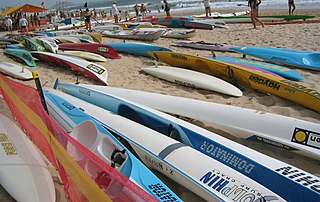
Surf lifesaving is a multifaceted social movement that comprises key aspects of voluntary lifeguard services and competitive surf sport. Originating in early 20th century Australia, the movement has expanded globally to other countries, including New Zealand, Ireland, South Africa, and the United Kingdom. Surf lifesavers in Australia are colloquially known as "Clubbies".
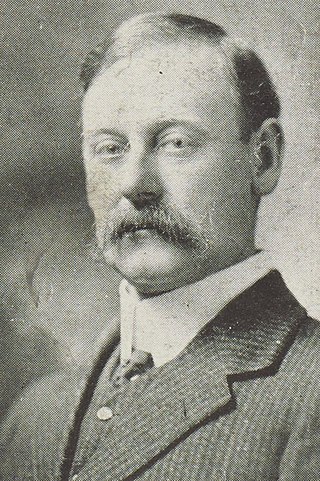
John McDonald was a New Zealand politician. He served as mayor of Dunedin from 1908 to 1909, the first New Zealand-born person to hold the office.
Surf Life Saving Northern Region is the largest of four regions that make up Surf Life Saving New Zealand. As of the 2021/2022 season, it is made up of 18 clubs that look after 22 patrol locations from Ahipara to Raglan on the West Coast and from Whangārei Heads to Takapuna on the East Coast.
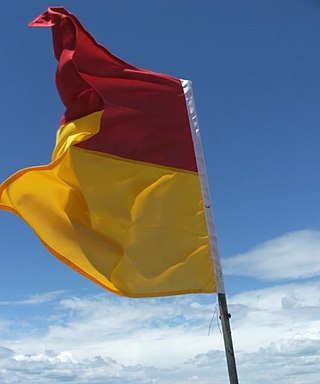
Surf Life Saving New Zealand (SLSNZ) is the national association representing 74 Surf Life Saving Clubs in New Zealand. The organisation's motto is 'In it for Life'. This refers to both the long relationship many members have with the organisation, as well as to the organisation's purpose of preventing drowning and injury, thereby saving lives.

Surf Life Saving Clubs are volunteer institutions at Australia's beaches. The clubs conduct surf lifesaving services on weekends and public holidays, and in the 2014-2015 season they saved 12,690 people. They also host many beach sport activities, such as Nippers, surf carnivals and other competitions. The SLSCs are responsible for the education of Lifesavers including operation of Inflatable Rescue Boats (IRBs) and maintaining radio communication with other beaches and air rescue resources.
Cory Francis Hutchings is a former world surf lifesaving Ironman champion from Gisborne, New Zealand. Hutchings was born in Gisborne to a family of passionate sportspeople. His father Ben was the coach of the New Zealand men's canoeing team who won gold in four events at the 1984 Los Angeles Olympics. Cory's involvement in surf lifesaving begun at age five.

Piha Surf Life Saving Club is a surf lifesaving club for the southern section of Piha, on the west coast of Auckland, New Zealand, some 45 km from the Auckland City centre. The patrol was featured in the TVNZ reality show Piha Rescue.
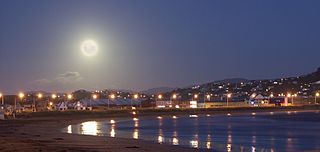
Lyall Bay is a bay and suburb on the south side of the Rongotai isthmus in Wellington, New Zealand.

Surf Life Saving Australia (SLSA) is an Australian not-for-profit community organisation that promotes water safety and provides surf rescue services.

Lifesaving is the act involving rescue, resuscitation and first aid. It often refers to water safety and aquatic rescue; however, it could include ice rescue, flood and river rescue, swimming pool rescue and other emergency medical services. Lifesaving also refers to sport where lifesavers compete based on skills, speed and teamwork. Lifesaving activities specialized in oceanic environment is called surf lifesaving or coastal lifesaving.

St Kilda is a suburb of the New Zealand city of Dunedin. A densely populated residential suburb, it lies on the southern part of the city's central plain, to the southwest of the head of the harbour and immediately north of Ocean Beach, parts of which are within the suburb and form its major geographical feature. Saint Kilda's 2001 population was 5,904.

St Clair is a leafy residential suburb of Dunedin, New Zealand. It is located on the Pacific Ocean coast five kilometres from the city centre on the southwesternmost part of the coastal plain which makes up the southern part of the urban area, and also climbs the slopes of Forbury Hill immediately to the west of this plain. St Clair's 2001 population was 4,179.

Caversham is one of the older suburbs of the city of Dunedin, in New Zealand's South Island. It is sited at the western edge of the city's central plain at the mouth of the steep Caversham Valley, which rises to the saddle of Lookout Point. Major road and rail routes south lie nearby; the South Island Main Trunk railway runs through the suburb, and a bypass skirts its main retail area, connecting Dunedin's one-way street system with the Dunedin Southern Motorway. The suburb is linked by several bus routes to its neighbouring suburbs and central Dunedin.
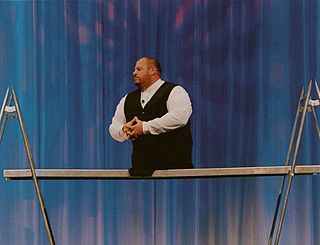
Anthony (Tony) Steven Christiansen is a motivational and inspirational speaker from New Zealand who lost his legs as a result of a train accident in his childhood.
Teneale Hatton is a New Zealand flatwater canoer.
Steven Kent is a New Zealand swimmer. He competed in the 4 × 200 metre freestyle relay event at the 2012 Summer Olympics.
The Bondi Surf Bathers' Life Saving Club is Australia's oldest Surf Life Saving Club, founded in 1907. The club was officially established on 21 February 1907 at the Royal Hotel in Bondi Beach, Sydney, New South Wales. The clubs aim is to ensure "No Lives Lost" at Bondi Beach and is a volunteer organisation that patrols Bondi Beach from October to April every year.

New Zealand is a popular surfing destination, with a long history of the sport and a varied coastline with locations suitable for all types of surfing. The West coast is notably consistent, with big swells and high winds, whereas the east coast is dominated by cyclone season swells; the North island is notably warmer than the South, but less consistent; mean temperatures range from 7 °C to 20 °C, depending on location and time of year. Winter is more consistent than Summer, with a southeasterly swell. The climate of New Zealand is varied, so different surf conditions are encountered across the islands.

Lifesaving South Africa (LSA) is a South African organisation that promotes water safety and provides surf rescue services. LSA is a founding member organisation of the International Life Saving Federation, and a member of Royal Life Saving Society. It is recognised by SRSA and SASCOC.
Clarice Lora Betty Main is a former New Zealand diver, who represented her country at the 1950 British Empire Games.














